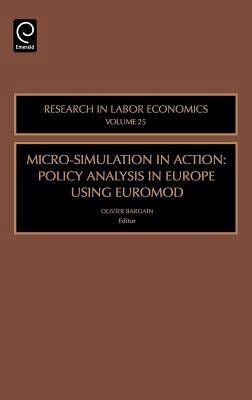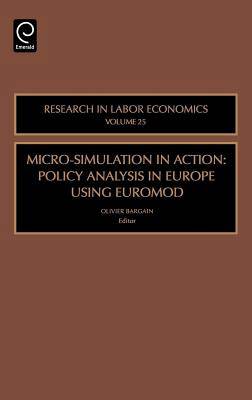
- Retrait gratuit dans votre magasin Club
- 7.000.000 titres dans notre catalogue
- Payer en toute sécurité
- Toujours un magasin près de chez vous
- Retrait gratuit dans votre magasin Club
- 7.000.0000 titres dans notre catalogue
- Payer en toute sécurité
- Toujours un magasin près de chez vous
Micro-Simulation in Action
Policy Analysis in Europe Using Euromod
124,45 €
+ 248 points
Description
This volume contains eight contributions aimed to advance policy analysis using the European tax-benefit micro-simulation model, EUROMOD. Microsimulation allows computing the whole set of taxes and benefits of a country and the resulting budget constraint for each household of a representative dataset. Thus, it can be used to evaluate how existing fiscal policies alter inequality, poverty and the overall income distribution. In addition, the simulation of financial incentives considerably improves the econometric estimations of labor supply behaviors, fertility choices, and marital decisions, thereby allowing better prediction to policy changes. EUROMOD goes once step further in the process of helping policy design: based on homogenized datasets and harmonized definitions of tax-benefit instruments, it allows to perform comprehensive international comparisons of EU-15 countries and to evaluate the optimality of tax-benefit policies. For instance, one can assess the effect of a common reform in particular institutional settings or the transmission of a tax-benefit system from one country to another. After an introductory chapter that present the history and the scope of the EUROMOD project, seven chapters on different policy issues follow. Among the discussed themes are: the relevance of the British tax credit to encourage female employment in continental Europe, the impact of hypothetical child benefits on child poverty in Southern Europe, the variety of effects of the same standard pension reform once implemented in different European countries, the role of the fiscal drag as an automatic stabilizer and its effect on labor costs, the revelation of social preferences from actual implicit tax rates. It aims to advance policy analysis using the European Tax-benefit Model. It evaluates how existing fiscal policies alter inequality, poverty and the overall income distribution. It investigates how financial incentives considerably improve the econometric estimations of labor supply behaviors, fertility and matrial choices.
Spécifications
Parties prenantes
- Editeur:
Contenu
- Nombre de pages :
- 228
- Langue:
- Anglais
- Collection :
- Tome:
- n° 25
Caractéristiques
- EAN:
- 9780762313471
- Date de parution :
- 23-10-06
- Format:
- Livre relié
- Format numérique:
- Genaaid
- Dimensions :
- 156 mm x 234 mm
- Poids :
- 498 g

Les avis
Nous publions uniquement les avis qui respectent les conditions requises. Consultez nos conditions pour les avis.





